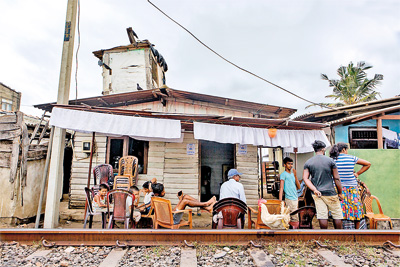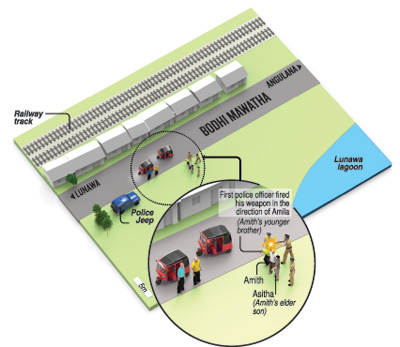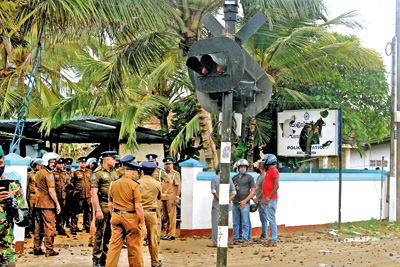News
People Vs police: Angulana erupts in violence again
All Amith Karunaratne had wanted was to get to work.

Daughter Hashini adjusts the garland placed around a photograph of her slain father Amith
The 39-year-old father-of-four was a fisherman. He left home with four others around midnight on July. They were heading towards their boats anchored at the Lunawa Lagoon. Less than 30 minutes later, he was dead—shot by officers from the Angulana police manning a temporary roadblock at the mouth of the lagoon.
The sense of injustice felt by the victim’s family, friends and inhabitants of the area ended in violent confrontation with police on Thursday evening, soon after the magisterial inquiry into the killing ended.
Before tensions flared, the Sunday Times visited Amith’s home in Lunawa. He had been laid to rest on Monday. The tiny wooden shack next to the railway track where he lived with his wife, four children and mother still had signs of the recent funeral. A temporary structure had been put up in front of the house to place the coffin; there wasn’t room enough inside.
Two photos of Amith were on a plastic table on which a clay lamp was burning. Funeral notices pasted on either side of the front door said “killed by a police bullet”.
The residents had gone to Moratuwa Magistrate’s Court for the magisterial inquiry. Among them were Amith’s wife, his 21-year-old son Asitha and 12-year-old son Akila. But 16-year-old Avishka and his sister, nine-year-old Hashini were home. Neighbourhood children kept the young girl busy with a game of carom. But she got up once to straighten the flower garland around the photograph.
Amith, by many accounts, had been a popular man who was “at every party, every funeral, every alms-giving”. He would stand up to injustice where he saw it. And he was also reportedly on good terms with senior officers of both the Angulana and Moratuwa police stations.
“How can they do that to someone with four children?” said Ayoma Srimali, 28, a relative who was helping to look watch the house and kids. Her voice rose in indignation. “How will it be like for them now, growing up without a father?”

The small, wooden shack that was Amith's home
People were deeply angry that the three officers involved in the alleged shooting had not been arrested. The sergeant, a constable and a police driver were interdicted but are yet to be detained.
The general conduct of the Angulana police also came in for harsh criticism. Area residents said most officers treated them poorly. This was not the first time, they said, that men from that police station stood accused of killing innocents.
While Angulana police set up roadblocks in their neighbourhood, the division actually fell under the purview of the authorities in Moratuwa, said W Damayanthi, 41, a family friend. “We don’t want the Angulana police setting up roadblocks here,” she insisted. “We don’t want any police here. We would rather see the roadblock be manned by the army.”
Friends and relatives also accused the Angulana police of having tried to intimidate two key witnesses by picking them up from their homes early that morning on the pretext of taking them to court. They were driven around—first to the Mount Lavinia, then to the Moratumulla, police stations—before court.
“We feel that this was an attempt at intimidating them into changing their story,” Ms Srimali said.
The site of the shooting is less than a kilometre from Amith’s home, towards Angulana. Here, two three-wheelers carrying Amith, his younger brother Amila, eldest son Asitha and two others, were stopped by the three policemen.
The officers had wanted to check the revenue licenses of the two three-wheelers. One driver only had a photocopy of his licence. The police said they would have to fine him. What happened next is in dispute.
Those who accompanied Amith claim one policeman tried to put his hand into Amith’s back pocket asking him where the “drugs” were. He had protested, saying he didn’t have any. His manner angered them and the policemen, who were allegedly intoxicated, assaulted him. Amith insisted that they had no right to strike him and an argument followed.
As things got heated, Amith dispatched one of his friends to find the telephone number of a senior officer of the Angulana police. One of the officers then allegedly fired his weapon in the direction of Amith’s brother, Amila. But he had ducked to the ground, causing the bullet to miss him. 
Thinking his brother was shot, Amith tried to reach him while his son, Asitha, tried to pull him away fearing more firing. It was then that the police allegedly fired on them. One bullet struck Amith in the head. The officers counter that Amith and the others had tried to beat them with rocks, leading them to shoot in self-defence.
Niluka Samanmali remembers the precise time she was woken up by the crack of gunfire. “It was 12.25 am,” the 41-year-old said. “I remember waking up, startled by the sound, and clutching my son. I heard someone shouting that his father and uncle had been shot.”
“I opened the door and saw two people lying on the ground, with two policemen standing near them,” she narrated. “A police jeep pulled up as I stood in the doorway. Several more policemen stepped out. One of the officers at the scene told them the men on the ground had attacked them, forcing them to open fire.”
Amith’s brother, who was on the ground after having fainted, got up. People picked up Amith, now bleeding profusely from the head, and loaded him into a three-wheeler. A long, dark blood stain is still on the road, marking the path.
“We splashed so much water on it, but the stain won’t wash off,” said a man at the site later this week.
Other than those directly involved, the incident was also allegedly seen by two others including a resident of the row of ten houses in the areas. Popularly called “Baba Mama”, he was one of the witnesses taken away at around 5a.m. by the Angulana police. They now fear for his safety, said Namali Perera, 38, a neighbour. They want the witnesses to be granted protection.
“He has no enemies, other than the police,” said another woman, who did not wish to be named, referring to the witness. “We are not prepared to let this go. If something were to happen to him, we know who to blame. We are all united and we will make them pay.”
The magisterial inquiry was held before the Moratuwa Magistrate. Four persons—Asitha, a driver of one of the three-wheelers, and two policemen involved in the incident—gave evidence. The Magistrate ordered that the investigation be transferred from the Angulana police to the Criminal Investigation Department (CID). The case will be taken up again on July 30.

The damaged Police station. Pix by Sameera Weerasekera and Reka Tharangani
There was consternation and anger outside of the court. Amith’s relatives had expected the suspects to be arrested. Already fearing intimidation of witnesses, heated scenes erupted. They marched to the Angulana police station. They were joined by other residents. Tensions that had been simmering since morning exploded into violence. Men, women, even children, hurled stones and anything they could take a hold of at the police station.
Forced back in, police fired tear gas. Then they launched a baton charge to break up the crowd. Special Task Force (STF) personnel were also called in. The police station and several vehicles were damaged.
Western Province Senior Deputy Inspector General of Police (SDIG) Deshabandu Tennakoon personally arrived to explain matters to the seething crowd and to appeal for calm. He gave assurance that the witnesses were not threatened or intimidated. He pointed out that the inquiry was now with the CID. He vowed the suspects would be arrested if it was found they had used excessive force or acted wrongly.
But SDIG Tennakoon also said those who attacked the police station and destroyed public property will have to face the consequences. He asked for anyone involved to come forward. One woman stepped up, leading him to praise her. Another woman and a man also owned up.
Fourteen suspects–nine females and five males—were arrested over the violence. They were allowed bail by the Moratuwa Magistrate on Friday. Nine policemen had also been injured. Acting Inspector General of Police (IGP) Chandana Wickramaratne has ordered an inquiry into the unrest.
The contentious roadblock, meanwhile, had been erected on the border between Moratuwa and Angulana police divisions, said Police Spokesman Senior Superintendent of Police (SSP) Jaliya Senaratne. “People involved in the incident are from the Moratuwa police division,” he said. “But, from what we know, the roadblock was in an area of the Angulana police division.”
The manner in which Angulana police treated the two witnesses was questionable, acknowledged a senior police source. “These people don’t know much about court procedure,” he criticised. “Given how volatile the situation was, police should have visited the witness’s homes the evening before and explained that they needed to be present in court.”
“To turn up suddenly at 5 in the morning and tell them to get dressed to go to court will only create suspicion,” he said. “Moreover, if they did take them to some other places prior to going to court, it raises some questions and warrants an inquiry.”
This episode had resulted due to a “miscommunication” between police and area inhabitants, said SDIG Tennakoon. He conceded that police “could have handled the situation much better”.
“It should not have escalated,” he said. “Residents must be careful though. We have drug dealers and underworld elements in the area who are trying hard to turn this situation to their advantage and pit people against the police.”
(Additional Reporting by Reka Tharangani Fonseka)

